Ever wondered whether you still need a TV Licence in the UK? With so many of us switching to streaming services like Netflix, it’s easy to get confused. Don’t worry – this guide is here to help.
I’ll break down the costs, let you know when you need a licence and when you don’t, and what could happen if you don’t follow the rules. Whether you love binging series or just watching the news, this simple guide will clear things up – and also touch upon some of the controversies that still surround the TV Licence Fee in the UK.
The TV licence is a tax used to fund the BBC. It is collected by the BBC (mainly through outsourced companies), and penalties of up to £1,000 are imposed if you fail to pay. In the past, those who never watched live TV were exempt, but due to changes in the law, people who only watch BBC iPlayer (via streaming) also have to pay.
Table of Contents
How Much Does A TV Licence Cost In The UK?
Let’s start with the most important bit: As of April 2024, the TV Licence Costs £169.50 For A Colour TV (and £57 for a Black and White TV).
In 2022, the fee was frozen for two years, so it’s been £159 until 2024, when the fee was finally increased (though not at the full rate of inflation).
Who Needs To Pay A TV Licence
Check out our handy “Do I Need A TV Licence” infographic to quickly see if you need to pay:
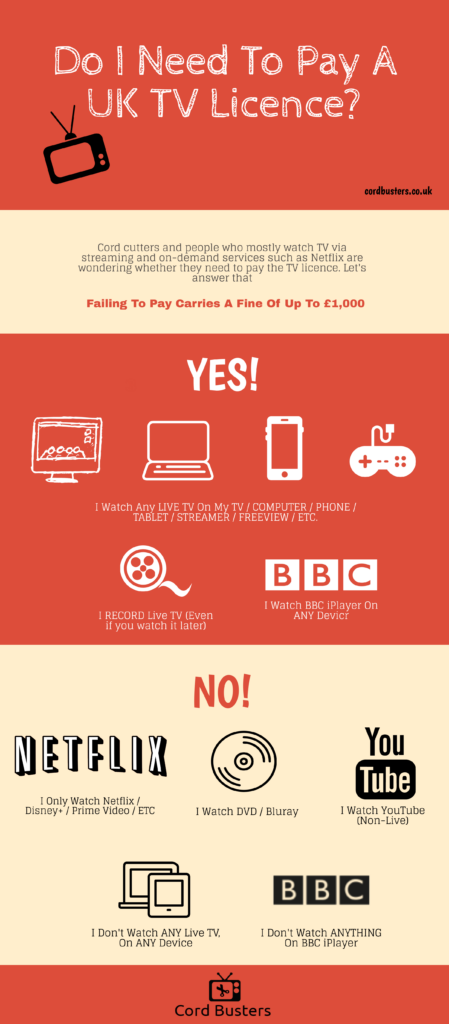
There are two main questions to ask yourself when you’re determining whether you need a licence if you watch TV:
- Do you watch or record ANY live TV on ANY device?
- Do you watch BBC iPlayer on ANY device?
If the answer is YES to either one of those, then in most cases, yes, you need to pay a TV licence.
Do note that the LIVE TV part refers to ANY live TV, not just the BBC channels. ITV, Channel 4, Channel 5… anything that is being broadcast right now, in real-time, falls into that category.
Plus, it doesn’t matter whether you’re watching live TV over the air (via Freeview for example) or if you stream it via broadband on an app like ITVX – if it’s LIVE, then you need a TV Licence.
Oddly enough, this also applies if you watch or record live TV from any other country (while you’re in the UK). Either via satellite, or even streaming via the internet – if you’re watching live TV from any and all countries in the world… it falls under the TV licence fee.
Also, don’t forget that RECORDING live TV also falls into this category. I’m assuming you’re not still using a VCR, but many Smart TVs, Freeview recorders, streamers, and TiVo-like boxes come with the option to record live TV. So if you watch OR record something live – you still need a TV licence.
However, this does NOT include watching programmes on catch-up apps and websites, such as ITVX, Channel4.com, etc. – if you only watch their programmes on these catch-up services (or as box-sets), and not during the original broadcast – you do not need a TV licence.
But wait! There’s the BBC iPlayer thing…
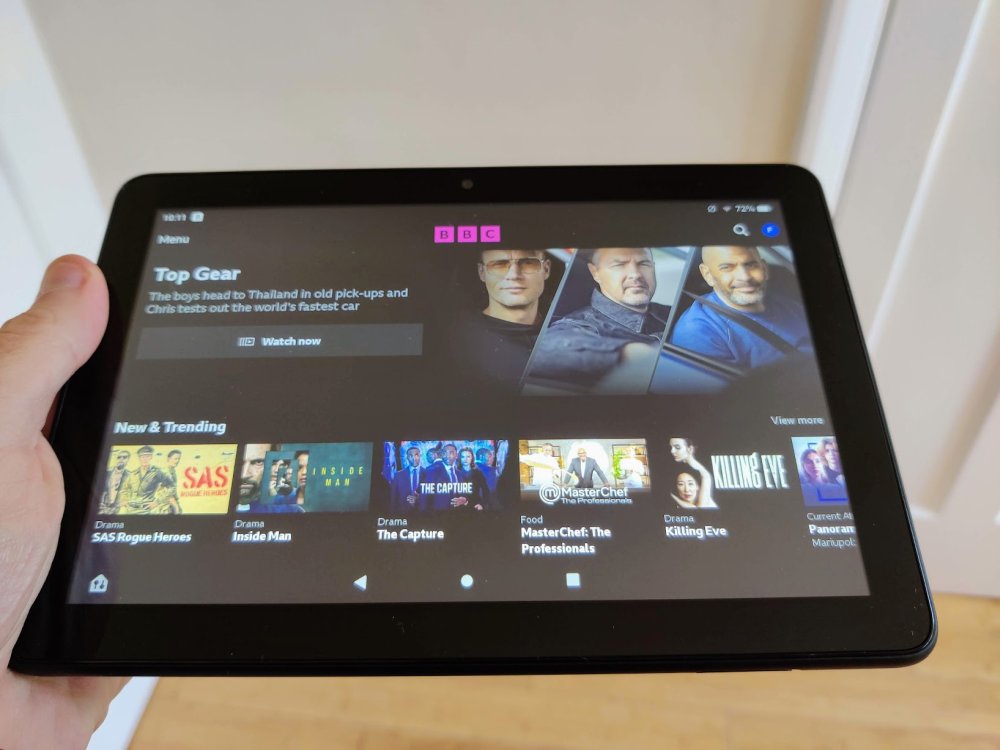
The second question, relating to BBC iPlayer, came into effect in September 2016. Up until then, there was an iPlayer “loophole”, where watching BBC programmes via iPlayer (the app, or directly on the website), did NOT require a licence. Well, that has changed – now, you need a TV licence for any type of watching you do with iPlayer – whether you stream it, or download it from iPlayer for later viewing.
Do note, however, that if you’re watching BBC programmes on other commercial VOD services (such as Netflix, BritBox, or buying a programme on Amazon’s Prime Video), then you don’t need a licence to watch, as you paid for those services separately.
It’s also worth noting that many believe a popular misconception that if you have a TV capable of showing the BBC, then you automatically need to pay a TV licence. However, that’s not the case – remember, the TV Licence is needed only if you actually WATCH the BBC on that TV (or other live channels).
Whether the device is capable of showing those channels is irrelevant – the act of watching (or recording) is what matters.
How Do I Pay The TV Licence?
The easiest way to pay the TV licence fee, is via the TV Licensing website, where you can set up a direct debit and other forms of payment.
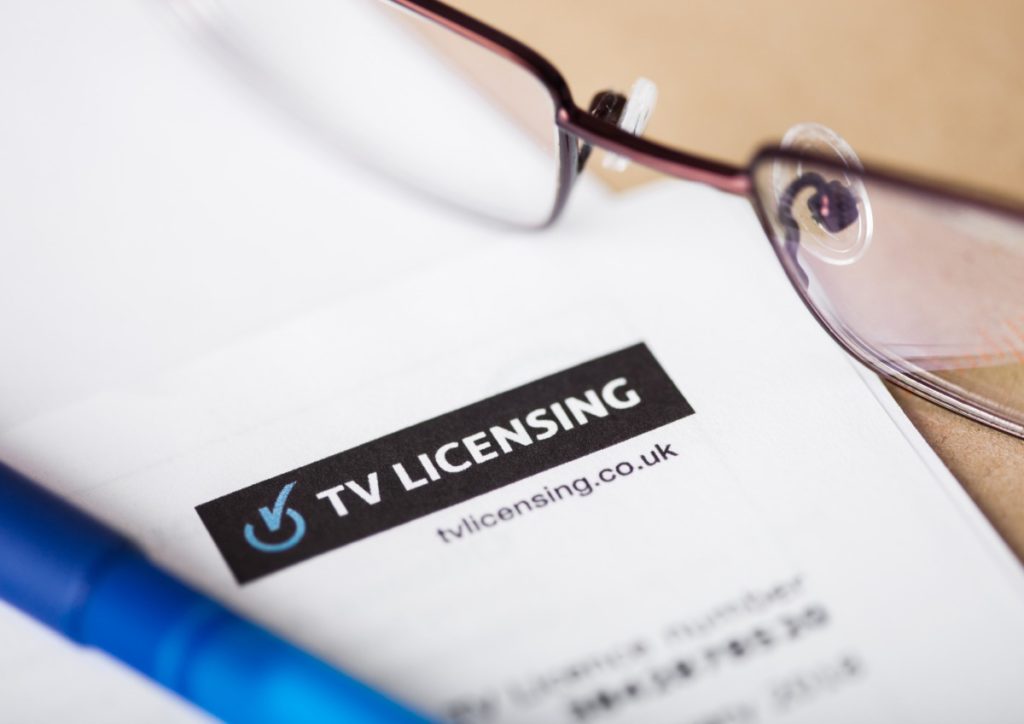
You can also pay via the TV Licence Phone Number: 0300 790 0368 for Direct Debit customers, or 0300 555 0286 for Payment Card customers.
Also, remember to be careful – there are a lot of fake TV Licence emails out there.
Who Doesn’t Need To Pay A TV Licence?
Basically, if you answered the two earlier questions with a NO, then you most likely don’t need to pay. Here are a few examples:
Do I Need A TV Licence To Watch Netflix?
No – in most cases. Most of the content on Netflix is not “live”, and is instead on-demand, so you don’t need a licence to watch that sort of content Netflix, whichever device you watch it on.
Even if you watch BBC programmes on Netflix, you still don’t need a TV licence for those.
However, in recent years, Netflix – rarely – streams live events (standup comedy specials, for example). In those cases, you would indeed need a TV licence, if you choose to watch that live event as it is being streamed. If you watch it later, on-demand – you’re fine.
This also applies to similar on-demand services like Amazon’s Prime Video (except for their live sporting events), Disney+, and physical media like DVD/Blu-Ray, even if you’re watching BBC programmes on those platforms.
Do I Need A TV Licence To Watch YouTube?
It depends. Most of the content on YouTube is on-demand, so you wouldn’t need a TV Licence to watch those videos.
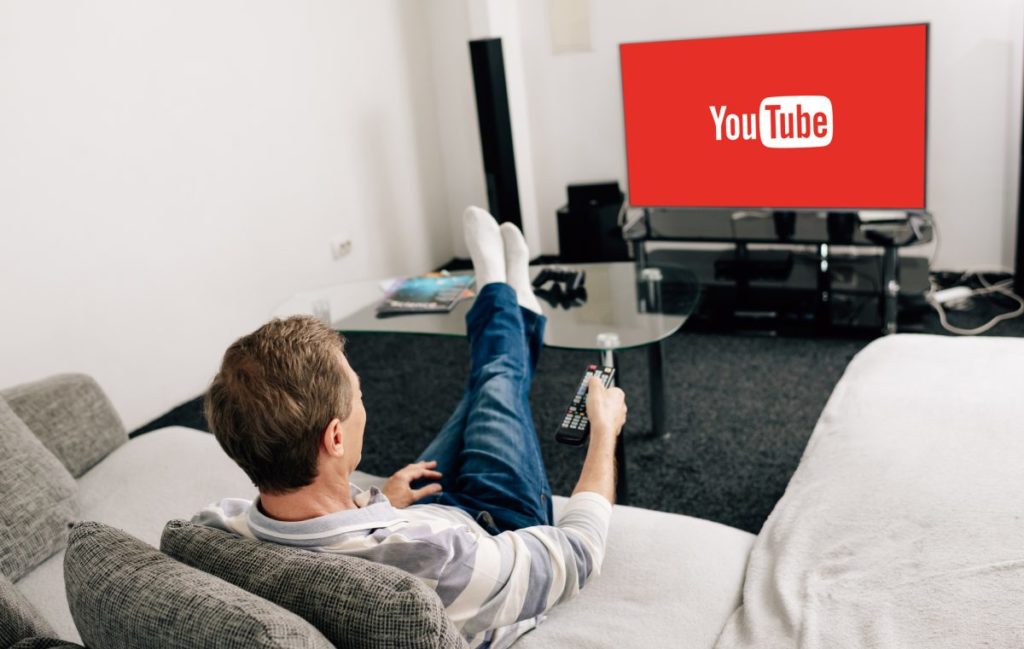
However, occasionally there are LIVE videos on YouTube – and if you watch or record those, regardless of where in the world they come from – you DO need a TV licence.
Things get a bit more complicated for live streamers on YouTube or services like Twitch, so we have a dedicated article for that question: Do I need a TV Licence for Twitch?
Do I Need A TV Licence To Watch NOW TV?
Sky’s NOW (formerly known as NOW TV, see our full NOW review) is primarily a streaming service, with on-demand content.
However, some of the content on NOW – such as the sports channels and the “live” version of Sky’s channels – is indeed LIVE. So, if you’re going to watch those channels, you do need a TV licence.
Do I Need A TV Licence If I’m Over 75?
Yes – for most people. Up until August 2020, people over the age of 75 were exempt from TV licences.
However, following a government decision to phase out subsidies for the exemption, the BBC had to make over-75s start paying the licence fee.
However, if you receive Pension Credit, you need to tell the TV Licensing body about it – and you will be exempt from the fee.
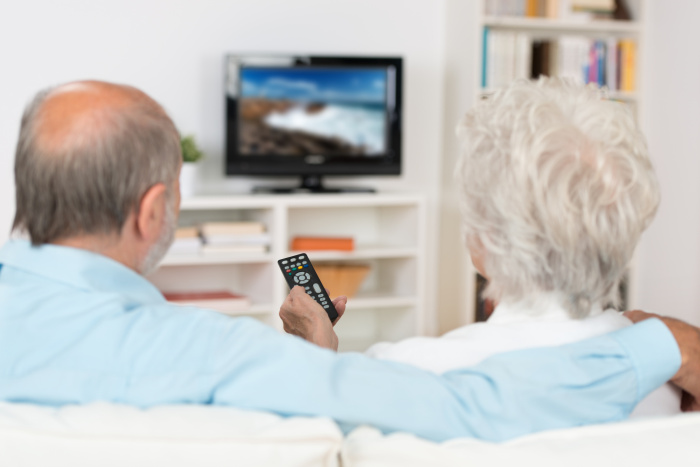
Additionally, if you or someone you live with is blind or severely sight-impaired, you only need to pay 50% of the TV licence.
Should I Tell Anyone I Don’t Need A TV Licence?
Giving Notification: If indeed you don’t need to pay the TV licence fee, you should notify “TV Licensing”, the body charged with collecting the money.
You are not required to notify them, but if you do, they are supposed to stop sending you angry letters urging you to pay.
The Bottom Line:
If you base your viewing around Netflix, Amazon’s Prime Video, etc., then just make sure you NEVER watch anything on iPlayer, AND never watch or record anything live on Freeview/Freesat (or via some online TV service) and then you can avoid the licensing fee.
How Will The BBC Know If I’m Watching Live TV And iPlayer?
This is one of the most controversial issues around TV licences, and the BBC usually remains intentionally obscure about the detection methods so as not to reveal their hand to would-be TV licence evaders.
There are, however, some things we do know.
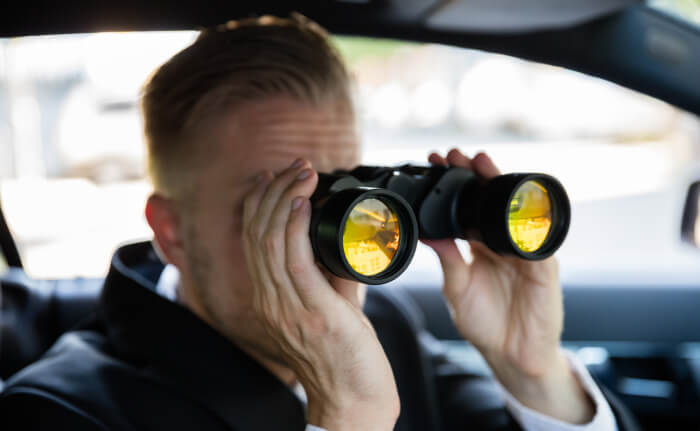
First, if they suspect you need to pay a TV Licence but you’re not paying, they might send inspection officers to visit your house. You’re not required by law to let them in, but if you don’t they might come back with a search warrant.
In addition, over the years “TV Licensing” has claimed to have sophisticated “detection” equipment, such as vans and handheld devices that, when in proximity to your house, can supposedly detect that you’re watching live TV.
When it comes to the new iPlayer rules, things get even more complicated. According to a report by The Telegraph last year, “TV Licensing” were supposedly using “spy vans” that could “sniff” your WiFi data, and detect patterns connected with iPlayer, hence confirming that you’re watching it.
These alleged “spy vans” were understandably the cause of an outrage, with people fearing an invasion of privacy. The BBC was quick to issue a statement, claiming that the information about these detection techniques is “inaccurate”:
“It is wrong to suggest that our technology involves capturing data from private WiFi networks”
Journalist and blogger Adam Banks, however, suggests in a lengthy post that these so-called “detection vans” are mostly smoke and mirrors, aimed at scaring the public into THINKING that the BBC has these magical detection technologies.
“The BBC’s wall of silence was accidentally breached in 2015, when it released a performance report that recorded just 116 detection requests across the UK in the whole preceding year.
If detection vans really had been ‘fanning out’ across the country, they’d been driving around either conducting large-scale illegal surveillance operations or doing absolutely nothing except at those 116 addresses – assuming all 116 requests were approved by the relevant senior BBC officials.”
Still, if you need to pay a TV Licence, you should – and it doesn’t matter how good the detection techniques are (or aren’t) – as it’s the law.
What Happens If I Don’t Pay The TV Licence Fee?
Failure to pay the TV licence fee is a criminal offence.
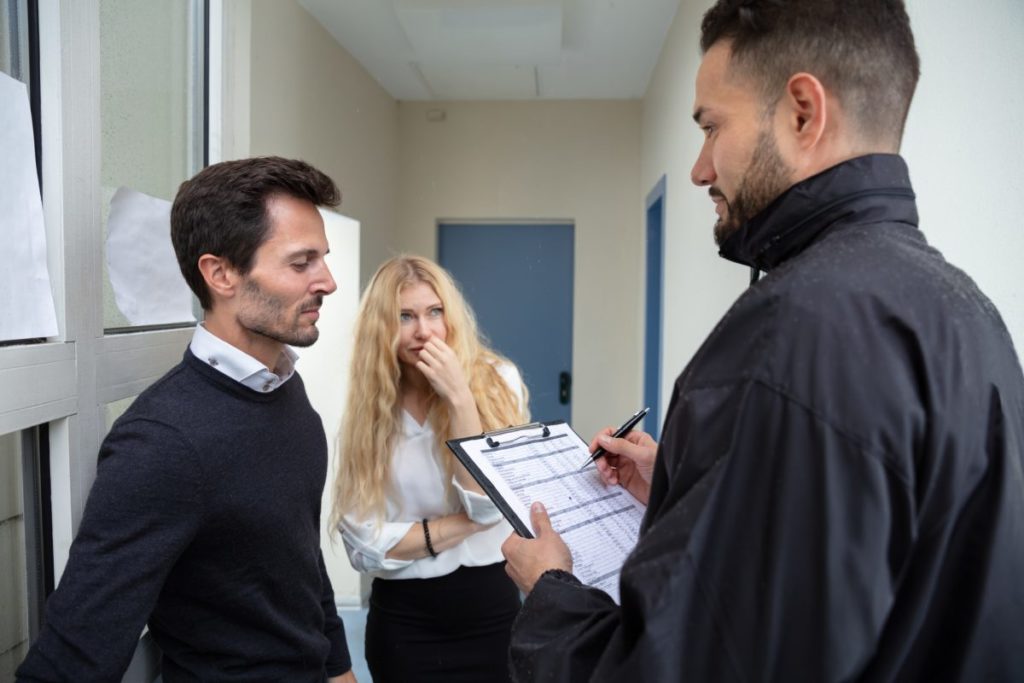
If BBC inspection officers suspect you’re evading the fee (when you should be paying it), you could end up paying a fine of up to £1,000 or, in rare cases, even go to jail (if you end up in court – and then not pay the fee and the fines).
While there’s often talk about decriminalising TV Licence fee evasion – that hasn’t happened yet, and tens of thousands of people are prosecuted every year.
What If I’m Having Trouble Paying The TV Licence Fee?
In 2023, the BBC announced a 10-point action plan aimed at supporting those struggling to pay the licence fee.
The BBC’s action plan includes measures like extended payment plans, partnerships with debt advice charities, and improved communication to reduce the prosecution risk.
Frequently Asked Questions
Can I watch iPlayer abroad?
Theoretically speaking, your licence covers you abroad as well. In practice, iPlayer can only be used for streaming while inside the UK.
You can, however, use iPlayer to download BBC programmes to your smartphone or computer, and you’re then able to watch them anywhere – within 30 days.
Another option is to use a VPN – some of them (such as Nord VPN) let you watch iPlayer practically anywhere.
What if I move in with someone who already has a TV licence?
If you’re moving in with either your spouse, partner or family member, or any type of joint tenancy or joint mortgage holder, then one licence is enough for the both of you.
If you already had a TV licence in your previous address, you can cancel it – and ask for a refund over your remaining months.
I’m a student – do I still need a TV licence?
In general, yes, but it’s an odd one: According to the TV Licensing website, if your parents already have a TV licence, you don’t have to pay, as long as you –
“Only ever use devices that are powered solely by their own internal batteries, and aren’t plugged into an aerial or the mains.”
That means you can watch iPlayer or live TV on your smartphone or tablet, as long as it’s not connected to the socket while you’re watching. If, however, you watch or record on a telly, or on a plugged-in desktop computer – you will need your own licence.
Read more information about students on the TV Licensing website.
I watch live TV from other countries. Do I also need a TV licence for that?
Sorry, but you do. Even if you’re watching live TV from a different continent, via the internet or a satellite, the law refers to ANY “live” TV – it doesn’t matter where the feed is coming from. So as strange as that sounds, you would need a licence even if you watch or record live foreign TV.
Does my licence cover watching TV outside of the house?
Yes, you can watch iPlayer or live TV on your smartphone or tablet, anywhere, as long as the device is not connected to the mains or an aerial.
That means you can watch on the tube, and you can take your laptop with you to that holiday cabin and watch – as long as you don’t PLUG IT IN while watching.
I bought live Pay Per View content, do I need a licence for that?
In some cases – yes. If you buy/rent a movie off a watch-on-demand VOD service (like the Amazon Prime Video store), then no. But if you’re buying the right to watch a movie or a sporting event as it’s being broadcast LIVE, then in effect you’re watching live TV, even though you’ve paid for it separately. So you would need a TV licence as well.
In addition, if you buy BBC programmes on a VOD service like Amazon Prime Video – you don’t need a TV licence for that.
I’m moving and my address will change. Do I need to notify anyone?
Your TV licence can move with you, but you have to update your details on the TV Licensing website.
Do I need a TV Licence to watch BBC programmes on BritBox?
No. BritBox (which is now a part of ITVX Premium) is a subscription-based video-on-demand service from ITV, that has programmes from the BBC archives (among other content).
So although some of these are BBC programmes, they don’t have the same status as programmes on iPlayer, as BritBox (via ITVX) is a subscription service – so it would be like watching BBC programmes on a DVD, for example. Therefore, you don’t need a TV licence for BritBox.
Do I Need A TV Licence For Sky Glass / Sky Stream?
Yes, in many use cases, you will need a TV Licence for Sky Glass and Sky Stream – even if you’re recording to “the cloud”.
These devices feature a ‘Playlist’ function where you can add live programmes for later viewing. Whether this content is later streamed as a catch-up version or a cloud recording of the live show, TV Licensing has clarified that a TV Licence is necessary for both instances.
To understand more about the specific instances and nuances, you can refer to our detailed Sky Glass/Stream TV Licence guide.
I am in the UK for 6 months of the year and 6 months in Portugal. The signal for Terrestrial free to air TV was switched of a couple of months ago and I have now removed the big dish that picked up the signal and no longer watch TV in Portugal. As I will now only be watching TV for 6 months of the year when I am in England do I only pay for 6 month? and how do I do that
I’m a pensioner on pension credit. I pay the license fee. I mainly watch terrestrial channels with the Beeb and Channel 4 first. If everything was pay to view, how much viewing would I get for the same money, at the same quality? Much as I’d prefer not to have to pay, actually there’s no contest – quality above quantity any day…
Did you see the part of the article above that says if you are over 75 and in receipt of pension credit then you would be exempt from paying the TV license? If you have not already done so, you may want to contact TV Licensing and inform them you are getting pension credit as you could be due a refund. Hope that helps you but you could always contact TV Licensing direct to confirm this information.
The comments about the BBC paying celebrities extortionate salaries are something of a red herring. Yes, they might very well pay Gary Lineker about £2 million a year, but given that there is roughly 25 million TV licenses purchased each year, it means that each license payer is paying the princely sum of 8p a year to fund Gary Lineker. Personally, I couldn’t give a toss about 8p. I lose more than that down the back of the sofa. The bigger issue is a state broadcaster that forces you by law to pay for it even if you don’t watch it. For that reason and none other the day when the BBC crashes and burns I will throw a bloody party.
Surely in this world, we should be able to pay for what we want to watch, if we should choose to watch live programs from a company other than the BBC, why should we pay the BBC for that priviledge ?? If we had a system of passwords or sign-ins etc. provided by the company you pay, this surely would be best for all? The revenue recieved by the taxes on the huge salaries paid to the so called top celebs, is a major income to the gov.
The salaries are a false earning so the 40% tax bill, or more, provides the gov. with much welcome incoming tax. hence huge unrealistic salaries and a nice payoff to the gov. Can’t see how the gov would want change tha?. but we do need a fairer sytem, only pay for what YOU WANT to watch!!
I have a tv and aerial but no signal or very weak (ie no picture) due to the neighbour’s tree which now completely blocks the aerial. The neighbour will not trim or cut down the tree and there is no where else I can site the aerial. I don’t use BBC I-player. So I am paying £159.00 a year for a service that I cannot receive. Do I still need to pay for a licence? If I do then it is just a tax on owning a tv.
It depends on whether you’re watching any other LIVE channels.
Do I have to pay tv licence if I want to watch my friend ‘go live’ on Facebook or Instagram?
Or joining any online class that streams live on YouTube?
In most cases – No. You can read more about live broadcasts and the licence fee here
Do I need to pay the TV License to ‘go to church’ at the moment. Most churches are existing at the moment by streaming their services online because it’s not possible to attend in person. My church streams their services live on YouTube and also on their own website. Is it really any live broadcast by any individual or organisation that counts as a live broadcast? Does it matter whether it’s done via a ‘private’ website (not a popular online platform) or not?
Also, would watching streamers on a streaming platform such as on Twitch count as a live broadcast? E.g. a streamer who’s broadcasting themselves play a game and even if only 10 people are watching, that would still count as a live broadcast that you need a TV license for if you happen to be watching?
This is a very interesting question, and I for one, would appreciate an answer too.
Thank you for bringing this up – I checked both these issues with the BBC, and now have a dedicated article on whether a licence is needed for watching Twitch and other live broadcasts from non-TV bodies (the short answer is no… but it depends)
It’s seems one sided when the BBC force you to pay for Freeview channels.
Although under their performance rules. And show not aired on bbc1 or bbc2. Is entitled for repeat fees.
How can they class all Chanels worth a fee on one hand. And then claim their not when they pay artists?
I cancelled my TV Licence and notified the BBC.
To access my Netflix service I have to pass through the Guide screen into the Netflix App and for a few seconds I am accessing live TV.
My Netflix service sometimes disconnects automatically and the TV re-connects to a terrestrial programme. I don’t know whose fault that is: my Service Provider, my broadband connection. my TV top box or my TV. I always re-connect it within a few seconds, but It did this once when I had fallen asleep, so I don’t know how long I was technically breaking the law. Would these innocent errors be sufficient reason to fine me?
Where are the Freeview channels coming from? If your TV is connected to an aerial, and you disconnect the aerial from the TV (or the set-top box), then you’ll never see those terrestrial channels.
Thank you! I tried first by removing the aerial cable from the set-top box, but that didn’t ork. Then I removed it from the wall socket and it worked; I can no longer access terrestrial channels. Thank you; I was at risk of falling asleep, because my TV often loses contact with Netflix and reverts to terrestrial where I would be at risk.
Just cut your aerial wire coming in from the roof, that’s what I’ve done so no chance of that happening.
The truth of the matter is the public are forced to pay for this institution weather they watch the bbc programs or not
I have no dispute at all with your contentions of quality and neutrality but how do you feel about the gigantic amount of money paid by the BBC in salaries? Are you happy that the billions raised by the licence should be used to fund the lavish lifestyles of administrators and performers such as Jimmy Saville? Just how much of our licence fee goes towards quality and neutrality? Is the BBC a cash-cow supported by our altruistic beliefs?
Sorry, my post (Pat) was intended as a reply to JJ
I am UK born but living abroad and I can receive BBC and the rest.
I actually inquired whether there was a scheme for people like me to pay, I would pay if I could.
The BBC is simply the best TV company in the world, ground breaking quality – just think back to Walking With Dinosaurs, Strictly Come Dancing ( actually not my thing but my God the production values are ground breaking ) and for people who still like a bit of mental stimulation or to follow the Arts BBC4.
With the likes of Murdoch the BBC is a bastion of quality and neutrality – the BBC and UK quality TV needs peoples support.
I would never want to dodge the license – just try visiting the US and see what kind of rubbish they have to live with and the frequency of advert breaks to see what a commercially funded TV network is like, without the BBC to keep her on her toes I am sure ITV would sink into a pit of lowest common denominator appeasement. The flagship of UK quality programming is the BBC – if it were ever lost we would regret it
These fab productions dont come for free, people need paying, studios need lighting and so on.
Tax is not a dirty word – its what you pay if you want to live in a decent society with road lighting, schools, police and the rest of it – television is no different.
I am very sorry but i totally disagree. If the bbc wanted to it could stop automatic access and charge like any other tv service like prime Netflix and so on, if the service is as good as they make out then they will survive but to force people to pay to watch services that are already paid for by other means is just wrong as you end up paying twice. And just becouse the government is in bed with the bbc then we are forced to pay for a service that we don’t want.